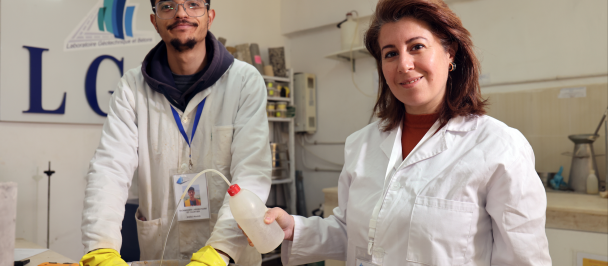Written by: Ms Takoua Tayari, Business and Human Rights administrator
A women-inspired journey: The Business and Human Rights Initiative in Tunisia
10 mars 2022
My job in UNDP Tunisia is people centered, and, in this context, I have been privileged to anchor my actions based on people's rights, perceptions, needs and deepest hopes.
Within the framework of our access to justice programme in Tunisia, and most particularly the Business and Human Rights initiative that I manage, UNDP has been supporting the achievement of sustainable development, including with a focus on the promotion of human rights. While it is no surprise that this journey over the last three years at UNDP has involved the active participation of women, what actually surprised me the most is a whole another level of greatness, a women-centred greatness, particularly among the women clam collectors I have met.
Defying danger
I experienced what women clam collectors call “the road of death” they take every day, while riding on the back of a pick-up owned by an intermediary. One such ride was enough for me to feel insecure and uncertain about the fate of the trip. Such rides are usually unsafe, unsteady and overcrowded. Women are overexposed to the sun rays or to heavy rain on their way to their workplace. A scarf or a hat is their only protection against the weather’s toughness.
Hundreds of road accidents have taken place over the years, including causing the fatal deaths of women. It however became apparent through our Business and Human Rights survey conducted in November 2021 that none are entitled to insurance or social protection, either because they are unaware of the existence of such mechanisms, or because of the complexity of administrative procedures. This is why our future intervention will focus on improving access of women clam collectors to social protection and insurance.
Overexploited, overworked and underpaid is what sums up their working conditions. Intermediaries are responsible for the transport of women clam collectors. The clams collected are sold to intermediaries at cheap prices (5 TND for a Kg), who sell it to corporates, hotels and restaurants at 25 TND for a Kg at least. Most of the time, women are afraid to report such practices; at the same time, they cannot afford the costs of access to justice, the complexity and slowness of procedures and fear the impact of bribery and corruption on the process.
Unbeatable
Women clam collectors are currently jobless since the government officially suspended the clam collection season due to environmental concerns. Women clam collectors have resorted to other activities, including shepherding, harvesting olives, carpet knitting, mending fishing nets, in addition to householding.
Most of the women we interviewed however cling to clam collecting. They grew up with it and had no opportunity or choice to do something else. Clam collecting defines who they are, their roots and it is often the only job that gives them satisfaction.
Inspiring
Most of women clam collectors I met have had no formal education; alternatively, they went to primary school, if the family situation allowed it. Many confessed they wish they had the opportunity to pursue their education, earn a degree and have a career that allows them to have easier lives. This motivated them to encourage their children to do well at school. Despite fatigue, these women multiply their activities to afford their kids’ education and avoid any excuse of dropping out.
Regardless of all the vulnerabilities they endure, women clam collectors remain hopeful and seek to improve their situation, whether through the participation with local professional organizations or the capacity-building opportunities provided by international organizations.
In the context of our work in 2021, one of the women we engaged warmly thanked UNDP for inviting them to take part of the Business and Human Rights process, to improve their knowledge on human rights and encourage them to speak up.
As I never had the chance to respond, this is the opportunity to say that I am the one to thank them for trusting me, and the organization I work for, to enter their homes, share their journey, concerns and hopes. It is mainly for them that I remain committed to this work and believe that our action will help shed the light on their situation and identify solutions to improve it.
Today, I would like to honor their sacrifices, perseverance and strength. On the International Women’s Day, I express my gratitude, respect and admiration for women clam collectors and my commitment to translate their rights into action.

 Locations
Locations






